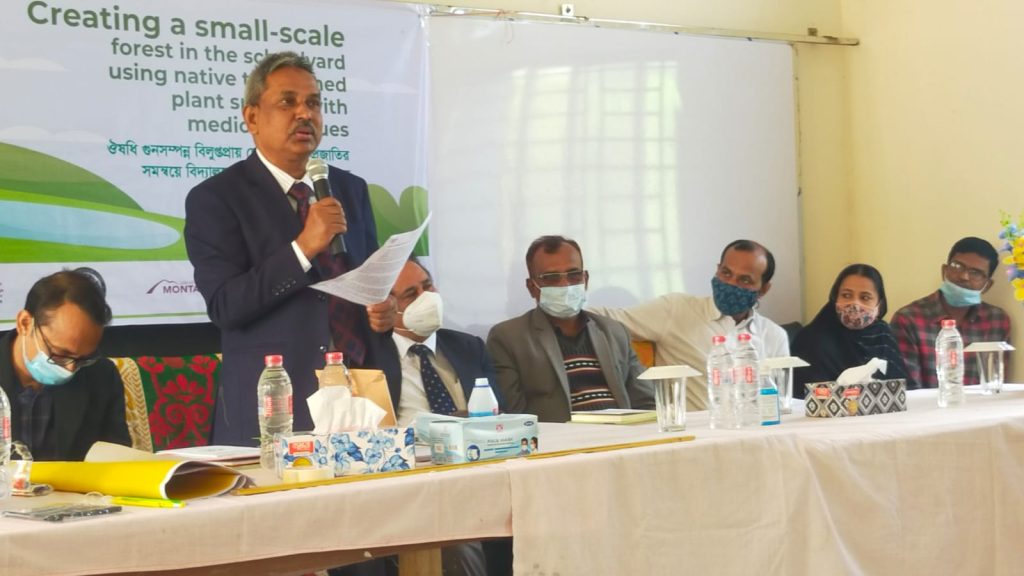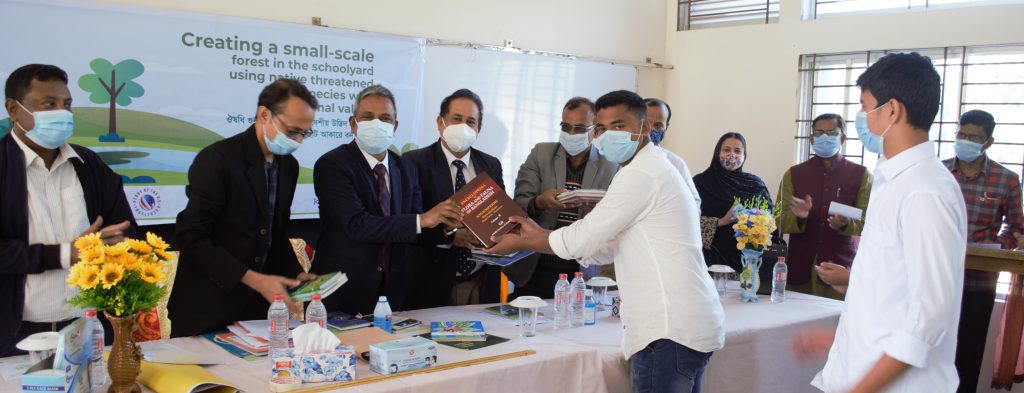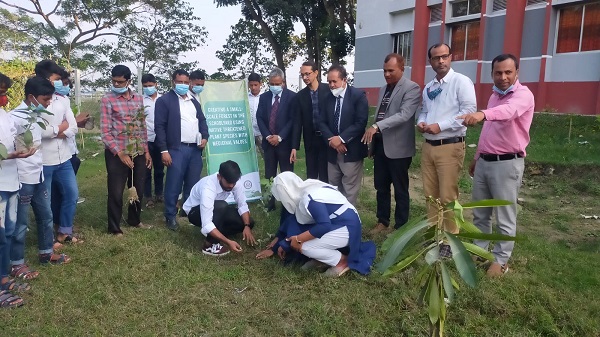To connect text to nature, a plant conservation initiation was held at Jahir Uddin High School in Sadar Upazila, Mymensingh district, Bangladesh, supported and aided through the assistance of the SUSI Educators: Small Grants program. The initiative’s primary purpose was to create a small-scale forest in the schoolyard with native endangered plant species with medicinal properties. When compared to traditional plantation procedures, the forest known as Miyawaki forest (also known as crowd forest) has a distinctive feature: nearly 30 times more trees are planted. Plant growth is 10 times faster, resulting in a 30 times denser plantation; guaranteed annual tree height increase of at least 1 meter; and, after the first three years, a completely maintenance-free, untamed, and native forest. A plant conservation club was founded with 30 pupils led by a teacher to perform activities. Over 36 varieties of rare species with therapeutic properties were initially planted by members of the plant conservation club. Soon, 100 types of endangered indigenous medicinal plants will be collected and planted. The project activities will facilitate student engagement by establishing real-world linkages through nature. Critical thinking and problem-solving abilities, as well as communication and teamwork, will dramatically increase due to the process.
A school-wide orientation event was held on December 18, 2021, followed by a tree-planting ceremony. As the keynote speaker, Md. Rishad Abdullah, Research Officer, Secondary and Higher Education, Zonal Office, Mymensingh, outlined the overall project goal and operations. Mr. Rishad cited a comprehensive analysis that found ‘about 600 tree species have vanished from the earth during the previous two and a half millennia’. This figure is more than twice the number of extinct birds, mammals, and reptiles. Bangladesh has a similar overall outlook. Numerous government and non-government organizations are attempting to conserve plant species diversity. Numerous conservation efforts are underway in Bangladesh’s protected forests, parks, and botanical gardens. While a few universities are engaged in plant conservation, it is fair to presume that no such program exists in secondary schools. Most secondary schools in the Mymensingh educational region have begun to plant fast-growing foreign species such as acacia, eucalyptus, and mahogany in response to market demand. These trees serve no purpose in nature other than to provide wood. After the project, the crowd forests within the school will serve as a plant conservatory for endangered indigenous Bangladeshi species with therapeutic properties. It is worth noting that this is the first institutional-level afforestation program of its kind, particularly at the secondary school institution level.
The organizer acknowledges the cordial support of Mohammad Abdul Quddus, Head teacher, & Nironjon Chandra De, Assistant Teacher of Jahir Uddin High School, for hosting the program. The organizer expresses gratitude to Professor Md. Azharul Haque, Director, and Abu Noor Md. Anisul Islam Chaudhury, Deputy Director (Secondary), Secondary and Higher Education, Zonal Office, Mymensingh; Sanjit Chandra Barman, Plant Curation Manager, and Taufiq Imtiaz Khan, Plant Conservation and Research Foundation; Assistant head teacher and other assistant teacher, all the students of Jahir Uddin High school to join the program. Additionally, the organizer would like to express gratitude to Muhammad Handi Gunawandi Gunawan, Lecturer at the Indonesia University of Education in Indonesia and co-planner of this project, as well as Anni Kristanti Yunandami (Teacher), Alfredo (Student), and Hendri (Student) from Senior High School (SMAN 2) in Cimahi, Indonesia, who participated virtually in the program.
We would like to express our gratitude to Anne Hanson, program manager of the Maureen & Mike Mansfield centre. Dr Charles G. Zartman and Heather Hacking of SUSI in Chico, USA; and Tahnia Shahid of the US Embassy in Dhaka, Bangladesh.





No responses yet